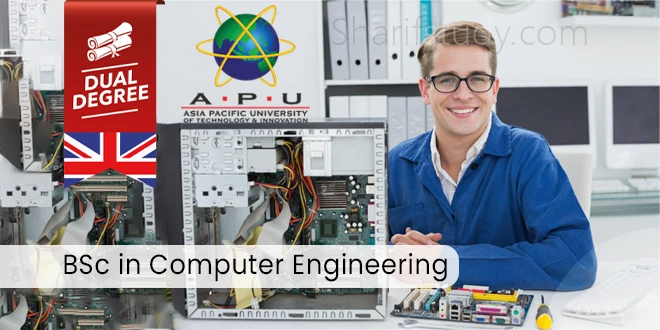Computer engineers build and analyze all hardware and software required for a computer system using concepts of electrical engineering and computer science. This includes the design of microprocessors and microcontrollers, as well as software and firmware for microprocessors and microcontrollers, integrated circuits, computer networks, and operating systems.
APU BSc in Computer Engineering degree mainly prepares graduates for a profession in the field of computer engineering. A Bachelor of Science in computer engineering degree additionally helps graduates find work in other fields such as patent law.
| Duration | Intakes |
| 4 Years (8 Semesters) |
14 Mar 2024 | 25 Jul 2024 24 Sep 2024 | 21 Nov 2024 |
Program Outline
APU BSc in Computer Engineering is specifically designed to teach students
- High-quality undergraduate engineering education by providing students with a curriculum that is firmly grounded in Computer engineering fundamentals.
- A study in the area of computer engineering which covers networking, database management, security systems, cloud infrastructure and data analytics.
Degree Level 1
In year 1,students are going to understand the fundamental engineering principles such as Circuit Analysis, Instrumentation and Measurement, C Programming, Programming with Python, Engineering Materials, Engineering Design, and Networking. On the other hand they will getting to know fundamental needs of employers and provide a strong basis in IT and entrepreneurship.
Common Courses
- Analysis of Circuits
- Fundamentals of Entrepreneurship
- Instrumentation & Measurement
- Engineering Design
- Engineering Mathematics 1
- Engineering Mathematics 2
- Introduction to C Programming
- Programming with Python
- Engineering Materials
Specialized Courses
- Introduction to Networking
Degree Level 2
In year 2, Students begin to train in courses that develop the necessary fundamental knowledge and skills in Computer Engineering at this level, including Electromagnetic Field Theory, Engineering Software and Applications, Analogue Electronics, Digital Electronics, Signals and Linear Systems, Introduction to Electrical Systems, Object Oriented Development with Java, Programming Concepts in C++, and Human Computer Interaction. Engineering Mathematics is presented to help students understand the engineering subjects.
Common Courses
- Analogue Electronics
- Digital Electronics
- Introduction to Electrical Systems
- Engineering Mathematics 3
- Electromagnetic Field Theory
- Engineering Software & Applications
- Signals and Linear Systems
- Innovation Process
Specialized Courses
- Human Computer Interaction
- Object Oriented Development with Java
- Fundamentals of Integrated Circuits Design
Internship
To bridge the gap between academic and professional worlds, students will experience an Internship or Industrial Training for at least 16 weeks. This ensures they transition smoothly from academic settings to real world job.
Degree Level 3
At this level, the most important things are to know about and be strong at Control Engineering, Communication Engineering Principles, VLSI Design, Microprocessor Systems and Embedded Software, Digital Signal Processing, Modern Communication Systems, Machine Vision and Intelligence.
There is more growth in the ability to use advantageous engineering skills along with strong analysis and critical thinking. In all classes, students continue to learn on their own.
Common Courses
- Control Engineering
- Communication Engineering Principles
- VLSI Design
- Engineering Mathematics 4
- Microprocessor Systems and Embedded Software
- Digital Signal Processing
- Engineering Project Management
- Venture Building
Specialized Courses
- Modern Communication Systems
- Machine Vision & Intelligence
- Analogue Integrated Circuits & Systems
Degree Level 4
In year 4, students will learn about modern skills that need to get a job after they graduate. It will help students grow personally and professionally, improve their technical skills, and learn how to come up with new ideas and handle the process of coming up with them.
Students will work on a number of engineering projects that will give them the chance to show off their advanced critical thinking, analysis, and problem solving skills. These skills will make them more employable after they graduate.
Common Courses
- Project Phase 1 (Investigation)
- Project Phase 2 (Implementation)
- Group Design Project
- Engineer in Society
Specialized Courses
- Computer Systems Security
- Knowledge Discovery & Big Data Analytics
Elective courses (Choose 2)
- Cloud Infrastructure and Services
- Internet of Things: Concepts and Applications
- Renewable Energy
- Emergent Technology
MQA Compulsory Subjects
- Appreciation of Ethics and Civilization (Malaysian Students)
- Malay Communication Language (International Students)
- Philosophy and Current Issues
- Workplace Professional Skills
- Integrity and Anti-corruption
- Co-Curriculum
APU-DMU Dual Degree
Students enrolled in the Bachelor’s Degree Program are presented with the opportunity to join the APU-DMU Dual Degree Scheme. By choosing this pathway, upon graduation, students will be awarded two Degree Certificates & Transcripts: one from Asia Pacific University (APU) in Malaysia and another from De Montfort University (DMU) in the UK.
Admission Requirements
| General Requirements | |
| Direct Entry to Level 1 of Degree | |
| STPM | 2 Passes in STPM with a minimum Grade C+ (GP 2.0) and a Credit in Mathematics at SPM Level or its equivalent.(MUET Band 2 is required for all Malaysian Students) |
| A-Level | 2 Passes in A-Level in any 2 subjects, and a Credit in Mathematics at SPM/O-Level/IGCSE or its equivalent. |
| UEC | 5 Grade B’s in UEC including Mathematics.(MUET Band 2 is required for all Malaysian Students) |
| Foundation/ Matriculation | Passed Foundation program (minimum CGPA of 2.0) with a Credit in Mathematics at SPM/O-Level/IGCSE or equivalent. |
| Direct Entry to Level 2 of Degree | |
| Diploma in Accounting | Passed Diploma with minimum CGPA of 2.0 and a Credit in Mathematics at SPM/O-Level/IGCSE level. |
English Requirements for International Students
- IELTS : 5.0
- TOEFL iBT : 40
- Pearson (PTE) : 47
- MUET : Band 3.5
Career Options
Studying Bachelor of Computer Engineering can lead to exciting jobs. As a Computer System Engineer, you will create systems that help computers work together. If you become a Computer Network Architect, you will design networks that let computers communicate.
Database Administrators manage data and keep it safe. Programmers write code to make software and apps. Each job plays a big part in making technology work for us in our daily lives.
- Computer System Engineer
- Computer System Analysts
- Computer Network Architect
- Computer Hardware Engineer
- Database Administrator
- Programmer
- IT Engineer
- Application Engineer
- Support Engineer
- Electronic Engineer
Program Fees
APU Bachelor in Computer Engineering fees is different for Malaysian and International students. Table below shows the fees for each year as well as total tuition fees.
| Malaysian Students | International Students |
| Year 1: RM 31,700 | Year 1: RM 32,000 (USD 7,270) |
| Year 2: RM 32,800 | Year 2: RM 33,100 (USD 7,520) |
| Year 3: RM 33,800 | Year 3: RM 34,400 (USD 7,820) |
| Total: RM 98,300 | Total: RM 99,500 (USD 22,610) |
 SharifStudy Best way to Study in Malaysia
SharifStudy Best way to Study in Malaysia




